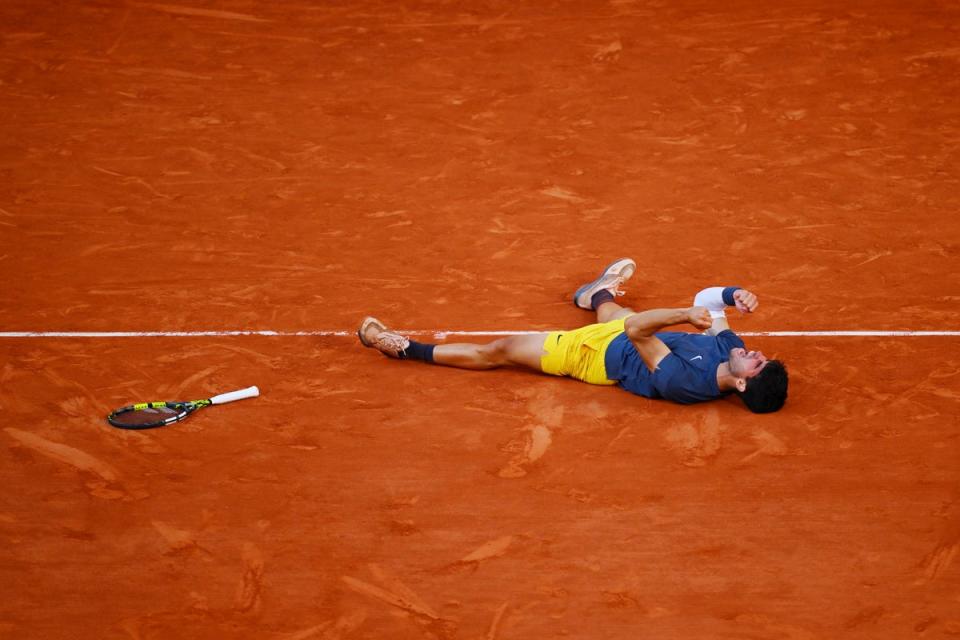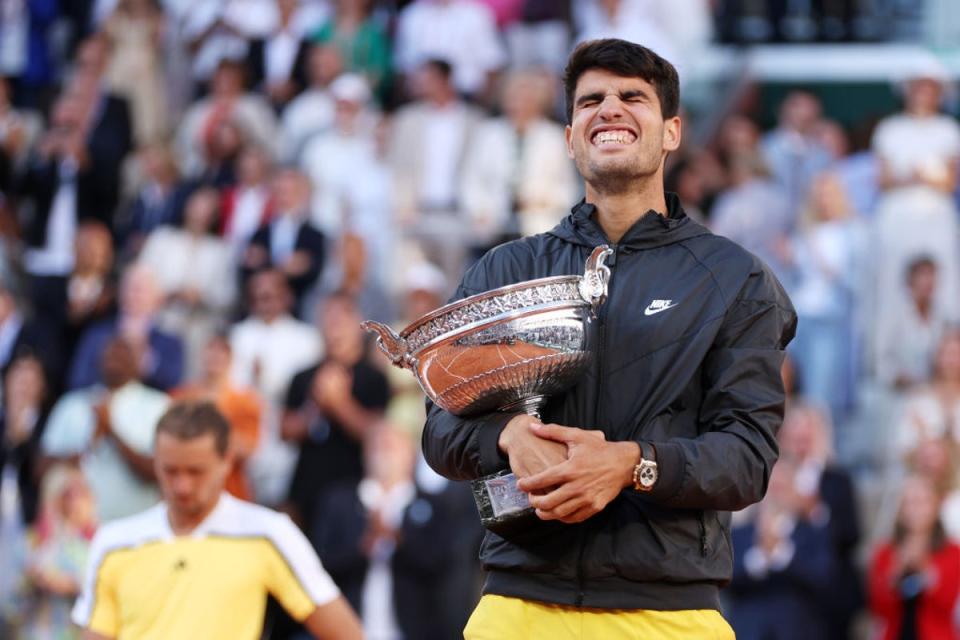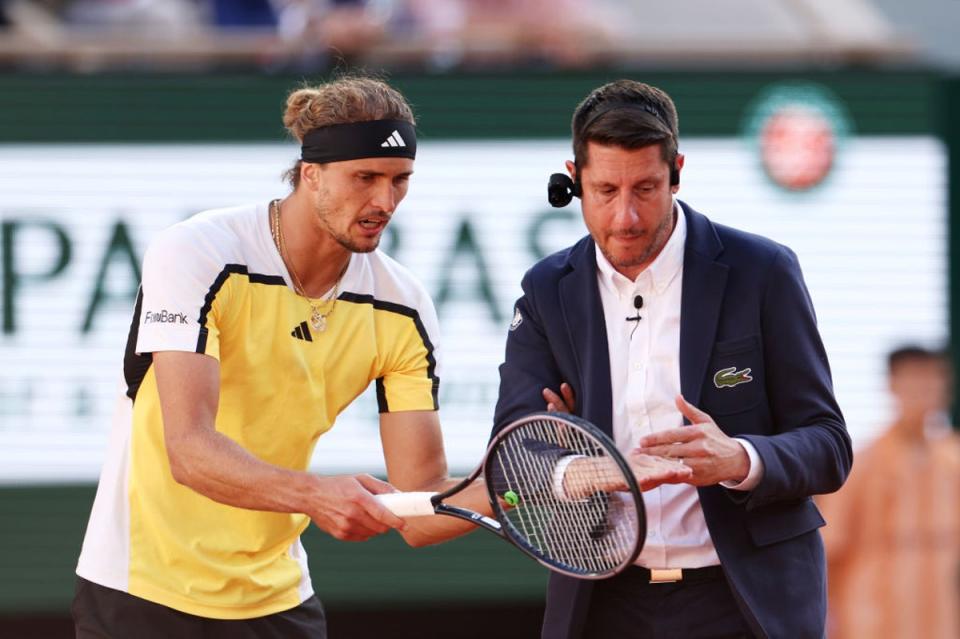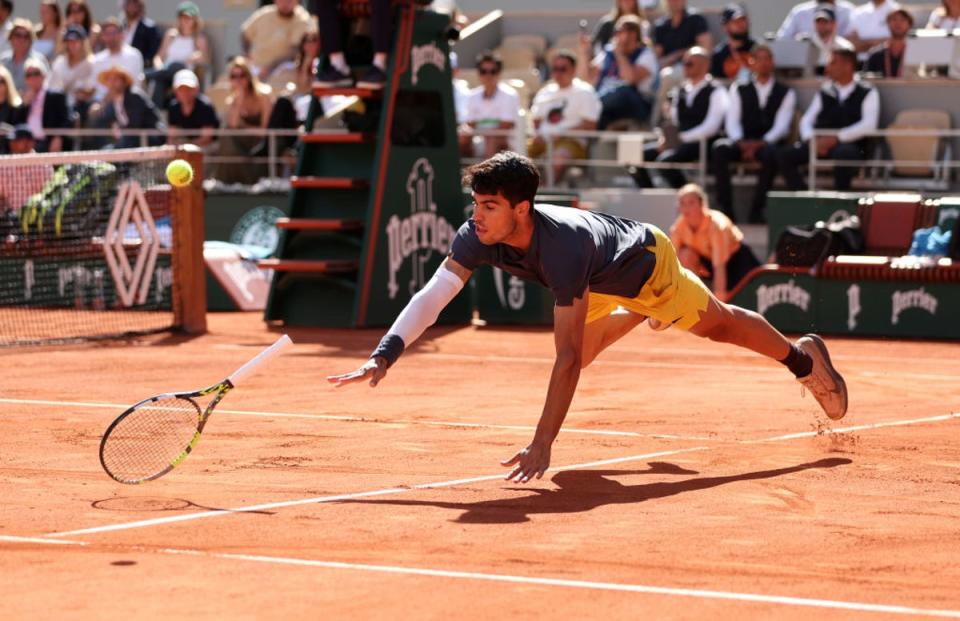Carlos Alcaraz and the turning point of an epic French Open fightback

Even as Carlos Alcaraz walked onto Court Philippe-Chatrier as a two-time grand slam champion, the 21-year-old felt the pressure of a childhood dream that was suddenly within reach in his first French Open final. Every June, back when he was a boy in Murcia, Alcaraz raced home from school to watch Rafael Nadal win title after title at Roland Garros, following the footsteps of Spanish champions such as his coach, Juan Carlos Ferrero, as well as Carlos Moya and Albert Costa.
Now, as the young Alcaraz’s ascension continues, he is walking in the footsteps of legends after joining that illustrious list of Spanish winners in Paris. In a thrilling, end-to-end final, Alcaraz battled from two sets to one down to defeat the fourth seed Alexander Zverev, 6-3 2-6 5-7 6-1 6-2, in four hours and 19 minutes. Zverev sensed his first grand slam was close and assumed control at several stages of a breathless battle but no one manages to escape quite like Alcaraz. No one defies defeat quite like he does, either.
Against the German’s thumping serve and restored belief, Alcaraz was down but never beaten: just as he did in his semi-final victory over Jannik Sinner, he hauled himself from behind to win the fourth and fifth. He improved his staggering five-set record to played 13, won 12, all while battling cramp on his right thigh. Closing in on a first grand slam title, Zverev left Alcaraz a narrow window: Alcaraz found it with a sublime forehand winner that curled brilliantly onto the line. The final turned from there.
The Coupe des Mousquetaires has a new winner, as Alcaraz added the French Open to US Open and Wimbledon titles. In doing so, Alcaraz became the youngest player in history to win grand slam titles on each of the three different surfaces. In what was the first French Open final without either Nadal, Novak Djokovic or Roger Federer in 20 years, Alcaraz found a fitting way to continue the illustrious legacy of the sport’s big three, the last players in men’s tennis to complete the feat.
Alcaraz is also the youngest player to win the French Open since Nadal, which, when Alcaraz made his breakthrough two years ago, defeating his idol and Djokovic as an 18-year-old in Madrid, felt inevitable at some stage. Clay was the surface where it all began, even if a triumph at the French Open had to wait until after the US Open and Wimbledon. But this, for Alcaraz, was far from inevitable: the Spaniard had won just one title since Wimbledon and arrived at the French Open having played just four times and one tournament on clay due to a worrying right forearm injury.

As for Zverev, there is only more heartbreak in grand slam finals. Four years on from standing two points away from the US Open title, where he lost from two sets up against Dominic Thiem in New York, Zverev was left to regret the moments that passed him by, particularly at the start of the decider. The German had taken an arduous route to his first French Open final, not least in the two years since suffering a horrific ankle injury in his semi-final against Nadal here. The 27-year-old reflected that it was part of his journey – in Paris he would not claim the ultimate retribution.
The truth for Zverev is Alcaraz has passed him by, too. The nerves from both players were evident at the start of the final, on a dry but blustery afternoon. Alcaraz, though, was first to settle: taking a comfortable opening set as he toyed with Zverev from the baseline, forcing his opponent to hit on the run and react to varying spin and depth. Alcaraz was enjoying himself while the tension Zverev was feeling was clear. Zverev vented to his box in frustration while trailing 2-1 in the second, but his level from there improved drastically.

Zverev found answers as he started serving wide and became more aggressive on his opening strike from inside the baseline, while limiting his errors in the punishing rallies. Zverev made just four unforced errors in the second set, as he won five games in a row to level the match. The German subdued Alcaraz behind an 80 per cent first serve, and didn’t allow his opponent a single break point as he took the second 6-2.
The momentum carried into the third: Alcaraz stood a game away from the set but Zverev clung onto the lifeline the Spaniard presented him in an untidy service game, with Alcaraz diving to the clay as Zverev finally claimed a break at the fourth opportunity. It sparked another run from the German: as the Spaniard became erratic, Zverev broke again when Alcaraz netted on a forehand from the baseline. A flustered Alcaraz complained to the umpire about the condition of the clay but Zverev outlasted his young opponent’s scrambling defence to take the second set point on a forehand winner. Alcaraz, having led 5-2, was stunned.

But he was not beaten: having held serve to start the fourth, Alcaraz jumped at the narrowest of opportunities against the Zverev serve, taking the opening break with a forehand pass that curled magnificently onto the line. It was Alcaraz at his finest. He secured the second break with a delicious drop shot that left Zverev stranded behind the baseline: a blow that zapped his opponent of energy and spirit. Yet, as Alcaraz looked to have hauled himself level, it was he who was struck down. As Zverev reduced Alcaraz’s advantage in the fourth, the Spaniard took a medical timeout and received rigorous treatment on his right thigh.
Alcaraz grimaced as he forced the fifth, but he had dragged himself into familiar territory. For Zverev, the German was entering his hall of horrors. Two games in quick succession summed up their respective ability to defy pressure. On the third game of the decider, Zverev unravelled, two easy volleys were missed, followed by a double fault and a backhand error. After that, Alcaraz looked to have handed the break back with a double fault, but to Zverev’s disbelief the second serve was ruled in. Alcaraz saved four break points to hold, conjuring a miraculous escape.
Alcaraz would have to save break point again, before the 21-year-old dug deep into his book of tricks to produce a stunning backhand winner, sliced so low that it passed Zverev by clipping the net cord. Alcaraz sealed the double break with the forehand planted onto the line, with Zverev shooting a lingering look at his opponent. Serving for the title, Alcaraz found one last forehand and he collapsed to the iconic red clay. There is a long way to go until he can be called the King here, but Alcaraz is on his way.

